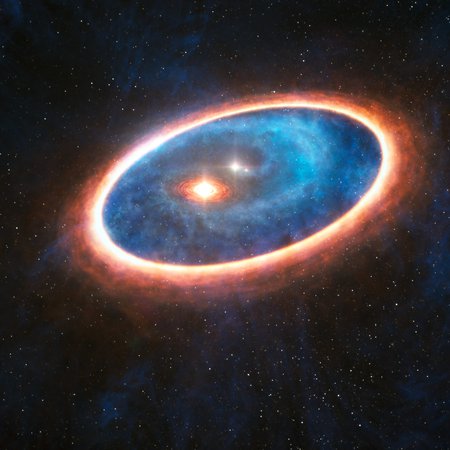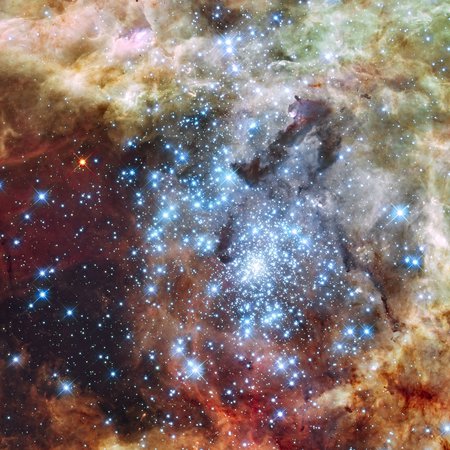Journey into space on land and on water

The two domed tents of the planetarium roadshow at the Rostock harbour.
Credit: BMBF/Wissenschaftsjahr 2023. Bundesfoto, Christina CzybikIn May, the Leibniz Institute for Astrophysics Potsdam (AIP) will participate in two events as part of the BMBF Science Year “Our Universe”. From 17 to 21 May, visitors can learn about astronomical and astrophysical research in Potsdam at a mobile planetarium located on Luisenplatz. The institute will also be featured on the exhibition ship MS Wissenschaft, which will dock in Berlin and its surrounding areas throughout the month of May. Both the ship and the planetarium can be visited for free.
The science ship “MS Wissenschaft” begins its journey on 9 May in Berlin and will dock in several areas around Potsdam, including Wannsee, Brandenburg an der Havel, and Ketzin. On board will be an exhibit from AIP about light in the universe. The exhibit, which was largely produced in the workshops of the institute's Technical Section, explains the concept of “light” in a broader sense. It demonstrates that the same astronomical object observed in different wavelengths of light can look completely different and can reveal new information. On 25 May, astronomy enthusiasts will have the opportunity to talk with AIP researchers from 2 pm to 5 pm during the “Meet the Scientists” event at the Ketzin tour stop. Dr. Iris Traulsen, Dr. Christian Vocks, and Dr. Peter Weilbacher will present their research on the MS Wissenschaft and answer questions from the public.
From 17 to 21 May, the 75m2 mobile planetarium of the nationwide planetarium roadshow “Universe on Tour” will stop at Potsdam’s Luisenplatz and invite visitors on a journey into the depths of the universe – from observing the sky with the naked eye to the invention of the telescope and modern-day astronomy. The 360° planetarium show is accompanied by an exhibition that provides information about the importance of light as an information carrier and the impact of light pollution on the environment, the population, and astronomy. Various stations provide information about the importance of light for astronomy, from star light, to cosmic rays and from X-rays to gamma rays. They also give insight into stellar and planetary nurseries – regions where stars and planets are born. The AIP is contributing visual content to the planetarium show for the Potsdam site and will have scientists present on Wednesday, Thursday, and Saturday. On 18 May at 8 pm, Professor Christoph Pfrommer, head of the Cosmology and High-Energy Astrophysics section at AIP, will give a talk on the topic “Fascination Galaxy Clusters – the Largest Collapsed Objects in the Universe” (in German).
The Science Years are a joint initiative of the German Federal Ministry of Education and Research (BMBF) and Wissenschaft im Dialog (WiD) to promote exchange between research and society. These events have been in existence for more than 20 years. This year, the focus is on getting people excited about astronomy and connecting ancient questions of humanity with current research. The events will address questions such as: Are we alone in the cosmos? What makes our Earth a habitable planet? What are black holes? With a variety of events and formats, these events are designed to engage the broader population, from kindergarten children and families to young people and young researchers, as well as multipliers in science, education, politics, and the media.

A sneak peek at the AIP exhibit on the MS Wissenschaft: screens with objects in different wavelengths, which can be operated via rotary and normal buttons.

A sneak peek at the AIP exhibit on the MS Wissenschaft: models of telescopes on Earth and in space.
Credit: AIPFurther information
MS Wissenschaft
https://ms-wissenschaft.de/de/
“Meet the Scientists” event
Roadshow "Universe on Tour"
https://www.wissenschaftsjahr.de/2023/universe-on-tour
Registration for schools
https://www.wissenschaftsjahr.de/2023/universe-on-tour/reservierungsanfrage/potsdam
Images
The two domed tents of the planetarium roadshow at the Rostock harbour.
Big screen size [1000 x 666, 140 KB]
Original size [2600 x 1732, 800 KB]
A sneak peek at the AIP exhibit on the MS Wissenschaft: screens with objects in different wavelengths, which can be operated via rotary and normal buttons.
Big screen size [1000 x 666, 110 KB]
Original size [3000 x 2000, 1.3 MB]
A sneak peek at the AIP exhibit on the MS Wissenschaft: models of telescopes on Earth and in space.
Big screen size [1000 x 666, 130 KB]
Original size [3000 x 2000, 1.3 MB]
The MS Wissenschaft
Big screen size [1000 x 1496, 1.2 MB]
Original size [2806 x 4200, 6.2 MB]
View into the exhibition in one of the tents of the planetarium roadshow
Big screen size [1000 x 666, 140 KB]
Original size [2600 x 1732, 790 KB]







